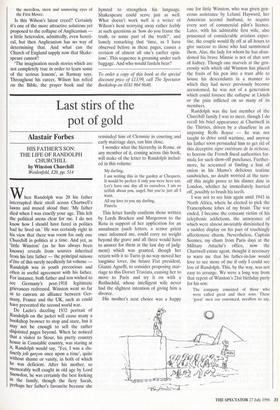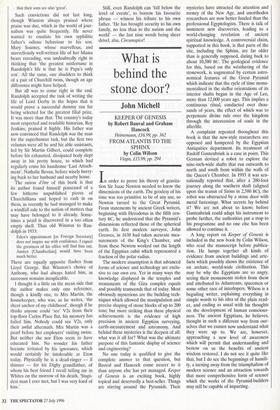Last stirs of the pot of gold
Alastair Forbes
HIS FATHER'S SON: THE LIFE OF RANDOLPH CHURCHILL by Winston Churchill Werdenfelcl, .f20, pp. 514
When Randolph was 20 his father interrupted their stroll across Chartwell's lawns and mused aloud thus: 'My father died when I was exactly your age. This left the political arena clear for me. I do not know how I should have fared in politics had he lived on.' He was certainly right in his view that there was room for only one Churchill in politics at a time. And yet, as 'little Winston' (as he has always been known) reveals from sources inherited from his late father — the principal raisons d'être of this surely needlessly fat volume Randolph was in youth precocious and often in useful agreement with his father. For instance, both father and son wished to see Germany's post-1918 legitimate grievances redressed. Winston went so far as to canvass an alliance between Ger- many, France and the UK, such as could have prevented the second world war.
De Lazio's dazzling 1932 portrait of Randolph on the jacket will cause many a bookshop browser to stop and stare, but it may not be enough to sell the rather disjointed pages beyond. When he noticed that a visitor to Stour, his pretty country house in Constable country, was staring at It, Randolph would say, 'Yes, I was a dis- tinctly foil garcon once upon a time', quite without shame or vanity, in both of which he was deficient. After his mother, to memorably well caught in old age by Lord Snowdon, he was certainly the best looking in the family, though the fiery Sarah, perhaps her father's favourite because she
reminded him of Clemmie in courting and early marriage days, ran him close.
I wonder what the hierarchy in Rome, or any member of it, coming across this book, will make of the letter to Randolph includ- ed in this volume: My darling,
I am writing this in the garden at Chequers. It would be perfect if only you were here too. Let's have one day all to ourselves. I am so selfish about you, angel, but you're just all I want.
All my love to you my darling, Pamela This letter hardly confirms those written by Lords Bracken and Margesson to the Rota in support of her application for an annulment (such letters, a senior priest once informed me, could carry no weight beyond the grave and all three would have to answer for them at the last day of judg- ment) which was granted, though her return with it to Turin in no way moved her longtime lover, the future Fiat president, Gianni Agnelli, to consider proposing mar- riage to this Dorset Traviata, causing her to move to Paris and try it on with a Rothschild, whose intelligent wife never had the slightest intention of giving him a divorce, His mother's next choice was a happy
one for little Winston, who was given gen- erous assistance by Leland Hayward, her American second husband, to acquire every sort of commercial pilot's licence. Later, with his admirable first wife, also possessed of considerable aviation exper- tise, the couple would fly off at all hours to give succour to those who had summoned them. Alas, the lady for whom he has aban- doned his brave Minnie is not of that sort of kidney. Though one marvels at the gen- erosity with which old Winston has placed the fruits of his pen into a trust able to house his descendants in a manner to which they had never previously become accustomed, he was not of a generation which could foresee the collapse at Lloyds or the pain inflicted on so many of its members.
Randolph was the last member of the Churchill family I was to meet, though I do recall his brief appearance at Chartwell in the Thirties, driven by a chauffeur in an imposing Rolls Royce — he was not taught to drive until wartime, and anyway his father soon persuaded him to get rid of this deceptive signe exterieure de la richesse, to borrow the French fiscal authorities for- mula for such show-off purchases. Further- more, he screamed at finding a hint of onion in his Mama's delicious teatime sandwiches, no doubt worried at the turn- off this might prove to his dinner date in London, whither he immediately hurried off, possibly to brush his teeth.
I was not to see him again until 1943 in North Africa, where he elected to pick the Francophone lobes of my brain. The war ended, I became the constant victim of his telephonic addictions, the annoyance of which were almost invariably diminished by a sudden display on his part of touchingly affectionate charm. Nevertheless, Captain Soames, my chum from Paris days at the Military Attache's office, now the Chartwell estate agent, thought it necessary to warn me that his father-in-law would love to see more of me if only I could see less of Randolph. This, by the way, was not easy to arrange. We were a long way from that report of Winston's 21st birthday party for his son:
The company consisted of those who were called great and their sons. These 'great' men are convinced, needless to say, that their sons are also 'great'.
Such convictions did not last long, though Winston always praised where praise was due, which in the world of jour- nalism was quite frequently. He never wanted to emulate his own syphilitic father's odious behaviour to his son. Mary Soames, whose marvellous, and marvellously well-written life of her Mama bears rereading, was undoubtedly right in thinking that 'the greatest misfortune in Randolph's life is that he is Papa's only son'. All the same, one shudders to think of a pair of Churchill twins, though an age difference might have helped.
But all was to come right in the end. Randolph accepted the task of writing the life of Lord Derby in the hopes that it would prove a successful dummy run for being selected for the greatest filial prize. It was more than that. The country's today most respected and readable historian, Roy Jenkins, praised it highly. His father was now convinced that Randolph was the man for the superhuman task, but the first two volumes were all he and his able assistants, led by Sir Martin Gilbert, could complete before his exhausted, dissipated body slept away in his pretty house, to which had regularly come his handsome 'Last Attach- ment', Nathalie Bevan, before wisely hurry- ing back to her husband and nearby home. The raison d'être of this book is that its author found himself possessed of a few hitherto unpublished pieces of Churchilliana and hoped to cash in on them, as recently he had managed to make a windfall sale to the nation of matters that may have belonged to it already. Some- times a pearl is discovered in a too often empty shell. Thus old Winston to Ran- dolph in 1933:
Eden's appointment [as Foreign Secretary] does not inspire me with confidence. I expect the greatness of his office will find him out. Austen [Chamberlain] would have been much better.
There are equally apposite flashes from Lloyd George. But Winston's choice of Anthony, who had always hated him, as successor remains inexplicable.
I thought it a little on the mean side that the author makes only one reference, though a kindly one, to Mrs Martin, the housekeeper, who was, as he writes, 'the sheet anchor of my childhood', though if he thinks anyone could 'see' V2s from their top-floor Carlos Place flat, his memory has failed him. Nobody could see V2s, only their awful aftermath. Mrs Martin was a pearl before her employers' visiting swine. But neither she nor Eton seem to have educated him. No wonder his father became irritated by his ignorance, which would certainly be intolerable at Eton today. Physically he is a dead-ringer — if thinner — for his Digby grandfather, of whom his best friend I recall telling me in Whites on the morrow of his death, 'Stupi- dest man I ever met, but I was very fond of him.'
Still, even Randolph can 'fall below the level of events', to borrow his favourite phrase — witness his tribute to his own father. 'He has brought security to his own family, no less than to the nation and the world' — the last nine words being sheer drivel, alas. Circumspice!



























































 Previous page
Previous page